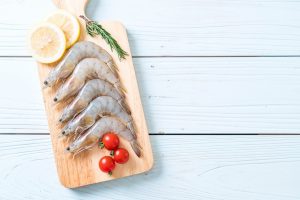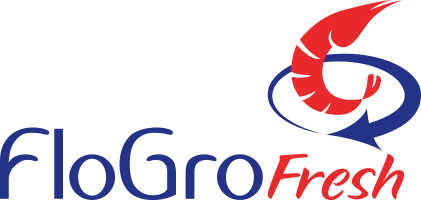 Prawns are in the top five seafood favourites chosen by us Brits. But most prawns eaten in the UK are imported frozen from the Far East and South America. In these regions, prawns can either be farmed or caught from the wild. Harvesting wild farming prawns severely damages the ecosystem. Farming prawns pollutes the local environment and produces prawns that are vulnerable to disease. Another major issue with prawn farming is the illegal fishing methods used to capture the tonnes of fish. As we approach National Marine Week commencing 25 July, it’s an opportune time to consider where the prawns you eat come from.
Prawns are in the top five seafood favourites chosen by us Brits. But most prawns eaten in the UK are imported frozen from the Far East and South America. In these regions, prawns can either be farmed or caught from the wild. Harvesting wild farming prawns severely damages the ecosystem. Farming prawns pollutes the local environment and produces prawns that are vulnerable to disease. Another major issue with prawn farming is the illegal fishing methods used to capture the tonnes of fish. As we approach National Marine Week commencing 25 July, it’s an opportune time to consider where the prawns you eat come from.
Here at FloGro we avoid the use of unsustainable feed sources by growing the prawn’s food naturally within the system itself, and supplementing this with additional nutrients. All our ingredients are fully traceable and sourced sustainably. We grow Litopenaeus vannamei, the Pacific White Leg prawn, in a contained ecosystem which mimics the biological and physical processes used by nature to remove waste materials and to oxygenate the water. Our closed-loop aquaculture system is perfect for the sustainable inland production of warm saltwater prawns. The Marine Conservation Society has given us their top rating for our methods of production and sustainability.
The seas around the UK are bursting with wonderful wildlife so looking after them not only means fishing responsibly but being conscious of what’s going into the water. During #PlasticFreeJuly it’s encouraging to know that since the introduction of the carrier bag charge, the Great British Beach Clean has recorded 40% fewer plastic bags on our beaches. There’s still a long way to go though. The UK Wildlife Trusts have some great advice on how we can all reduce our plastic use.
At FloGro we are striving to find a completely compostable box that we deliver our prawns in. Currently our boxes are made of polystyrene which is a fantastic insulator for ensuring our fresh prawns are delivered to you in tip top condition. But did you know that polystyrene is 100% recyclable? If the material is clean it can be reused to manufacture new boxes and if it isn’t clean, it can still be compacted and recycled into rigid plastic products. If your local recycling centre doesn’t accept polystyrene, you can reuse our boxes in a number of ways.
Some customers have reinvented their box as:
- A coolbox for drinks/picnics
- A tray for growing seedlings
- To aid drainage in plant pots by breaking the box into pieces
- To take when you go fishing to transport your bait or catch!
- You could even convert it into a hedgehog house.
So why not begin your support for National Marine Week by buying sustainable British prawns? Not only will you create a deliciously tasty meal but it’ll be in the knowledge you’re helping to protect our seas.
